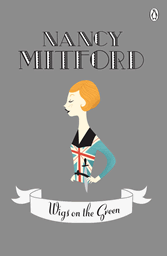
WIGS ON THE GREEN
Date of First Publication: 1935
www.amazon.co.uk
www.amazon.com
www.heywoodhill.com
www.penguin.co.uk
Eugenia Malmains is one of the richest girls in England and an ardent supporter of Captain Jack and the Union Jackshirts; Noel and Jasper are both in search of an heiress (so much easier than trying to work for the money); Poppy and Marjorie are nursing lovelorn hearts; and the beautiful bourgeois Mrs Lace is on the prowl for someone to lighten the boredom of her life. They all congregate near Eugenia's fabulous country home at Chalford, and much farce ensues.
One of Nancy Mitford’s earliest novels, Wigs on the Green has been out of print for nearly 75 years. Two of Nancy sisters, Diana and Unity, objected to the satirical portrait of Sir Oswald Mosley (Diana’s lover and husband-to-be) and were furious with her for making fun of Fascism. The book caused a political rift between the sisters that lasted for several years. Nancy Mitford skewers her family and their beliefs with her customary jewelled barbs, but there is froth, comedy and heart here too.
‘“Britons awake! Arise! Oh, British lion!” cried Eugenia Malmains in thrilling tones. She stood on an overturned wash-tub on Chalford village green and harangued about a dozen aged yokels. Her straight hair, cut in a fringe, large, pale-blue eyes, dark skin, well-proportioned limbs and classical features, combined with a certain fanaticism of gesture to give her the aspect of a modern Joan of Arc. . . . “The Union Jack movement is a youth movement,” Eugenia cried passionately, “we are tired of the old. We see nothing through their eyes no longer. We see nothing admirable in that debating society of aged and corrupt men called Parliament,” . . .At this point a very old lady came up to the crowd, pushed her way through it and began twitching at Eugenia’s skirt. “Eugenia, my child,” she said brokenly, “do get off that tub, pray, please get down at once. Oh! When her ladyship hears of this I don’t know what will happen.” “Go away Nanny,” said Eugenia, who in the rising tide of oratory seemed scarcely aware that she had been interrupted.’